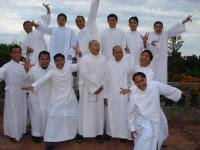A guardian angel is an angel assigned to protect and guide a particular person. The concept of tutelary angels and their hierarchy was extensively developed in Christianity in the 5th century by Pseudo-Dionysius the Areopagite.
The theology of angels, and tutelary spirits, has undergone many refinements since the 400s, and belief in both the East and the West is that guardian angels protect whichever person to whom God assigns them,[1] and present prayers to God on that person's behalf. The Catholic Church's calendar of saints includes a memorial for the guardian angels on October 2.
Origin
18th century rendition of a guardian angelThe belief that God sends a spirit to watch every individual was common in Ancient Greek philosophy, and was alluded to by Plato in Phaedo, 108. The idea appears in the Old Testament, although it is not specifically articulated nor delineated. The belief that angels can be guides and intercessors for men can be found in Job 33:23-6, and in the Book of Daniel (specifically Daniel 10:13) angels seem to be assigned to certain countries. In this latter case the “prince of the Persian kingdom” was referring to one of the fallen angels also known to many as a demon. The same verse mentions “Michael, one of the chief princes,” and Michael is one of the few angels named in the Bible. In the New Testament Book of Jude Michael is described as an archangel. The Book of Enoch, part of the Ethiopian Orthodox Tewahedo Church's canon of scripture, says that God will "set a guard of holy angels over all the righteous" (1 En 100:5) to guard them during the end of time, while the wicked are being destroyed.
In Matthew 18:10, Jesus says of children: "See that you do not look down on one of these little ones. For I tell you that their angels in heaven always see the face of my Father in heaven" (New International Version). This is often understood to mean that children are protected by guardian angels, and appears to be corroborated by Hebrews 1:14 when speaking of angels, "Are they not all ministering spirits, sent forth to minister for them who shall be heirs of salvation?"
In Acts 12:12-15 there is another allusion to the belief that a specific angel is assigned to protect each individual. After Peter had been escorted out of prison by an angel, he went to the home of 'Mary the mother of John, also called Mark'. The servant girl, Rhoda, recognized his voice and ran back to tell the group that Peter was there. However the group replied, "It must be his angel"' (12:15). With this scriptural sanction, Peter's angel was the most commonly depicted guardian angel in art, and was normally shown in images of the subject, most famously Raphael's fresco of the Deliverance of Saint Peter in the Vatican.
Beliefs
Christianity
Whether guardian angels attend each and every person is not consistently believed or upheld by the Church Fathers in Christian thought.[2] Saint Ambrose, for example, believed that saints lose their guardian angels so that they might have a greater struggle and persevere. Saints Jerome and Basil of Caesarea argued that sin drove the angels away.
Saint Gemma GalganiThe first Christian theologian to outline a specific scheme for guardian angels was Honorius of Autun. He said that every soul was assigned a guardian angel the moment it was put into a body, although such a thought requires the pre-existence of the soul/essence. Scholastic theologians augmented and ordered the taxonomy of angelic guardians. Thomas Aquinas agreed with Honorius and believed that it was the lowest order of angels who served as guardians, and his view was most successful in popular thought, but Duns Scotus said that any angel might accept the mission.
More recently, Saint Gemma Galgani, a mystic, stated that she had spoken with her guardian angel. The bed-ridden Italian writer and mystic Maria Valtorta wrote The Book of Azariah based on "dictations" that she directly attributed to her guardian angel Azariah, discussing the Roman Missal used for Sunday Mass in 1946 and 1947.
In his 1997 Regina Caeli address, Pope John Paul II referred to the concept of guardian angel twice, and concluded the address with the statement: "Let us invoke the Queen of angels and saints, that she may grant us, supported by our guardian angels, to be authentic witnesses to the Lord's paschal mystery".
Islam
There is a similar Islamic belief in the Kirama Katibin, two angels residing on either shoulder of humans which record their good and bad deeds. However, these angels do not have influence over the choices one makes, and only record one's deeds.
Prayer
19th century guardian angel at workThis is the traditional Catholic prayer to one's guardian angel.[6]
Angel of God, my guardian dear
to whom God's love commits me here.
Ever this day/night be at my side
to light, to guard, to rule and guide.
Amen.
In Latin:
Angele Dei,
qui custos es mei,
me, tibi commissum pietate superna,
illumina, custodi,
rege et guberna.
Amen.
Wednesday, September 30, 2009
Subscribe to:
Post Comments (Atom)














No comments:
Post a Comment